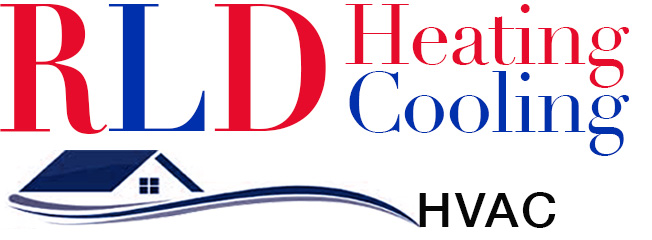How to choose a central air conditioner? Because you wouldn’t want to end up with an inefficient unit!

Buying a new central AC is complicated, especially if you’ve never shopped for such HVAC equipment.
It gets complicated because various reasons can go wrong.
If you make the right choice and buy a suitable central air conditioning system for your house, you get:
- A comfortable house.
- Comparatively lower energy bills.
- Saved from unnecessary repair costs.
- Protection from premature breakdowns.
However, the opposite happens when you make the wrong choice.
When you choose the wrong size or offensive unit type, you have to experience:
- Higher installation charges.
- The skyrocketing energy bills.
- Improper cooling and much more.
Now, you must wonder, what’s the mantra behind choosing the right central air conditioning system?
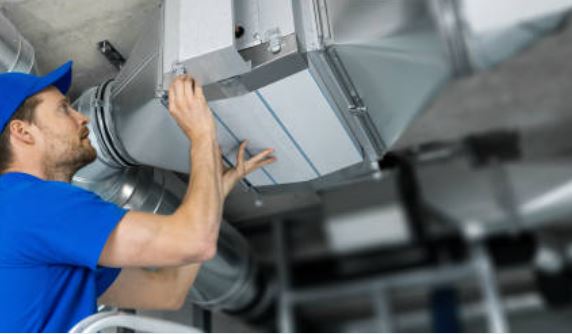
call 818-210-6669
Contact us 24/7 for your HVAC needs
Well! We have curated a list of factors in this blog to guide you and help you find the best cooling system for your home.
So, without a wait, let’s get into it.
Why do you need a properly sized air conditioner?
Choosing the right size for your air conditioner affects your unit:

- Energy bills.
- Lifespan.
- Cooling and comfort.
Therefore, when you receive an undersized unit, it can’t provide sufficient cooling and relief.
On the contrary, an oversized unit cannot run for an extended period to dehumidify your house.
Both undersized and oversized AC units cause uneven air distribution and higher energy and repair costs.
But both the undersized and the oversized units carry separate sets of problems.
Undersized air conditioning units
The undersized units have the following disadvantages:
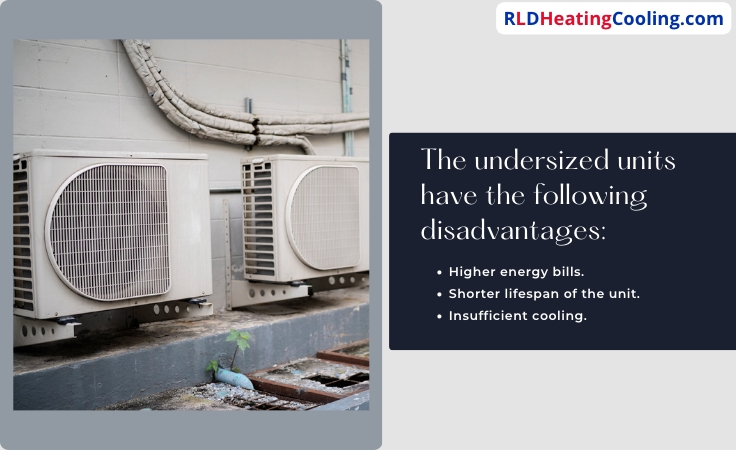
- Continuous running due to low cooling leads to more significant and faster wear and tear.
- Higher energy bills.
- Shorter lifespan of the unit.
- Insufficient cooling.
Oversized air conditioning units
The oversized units have the following inconveniences:
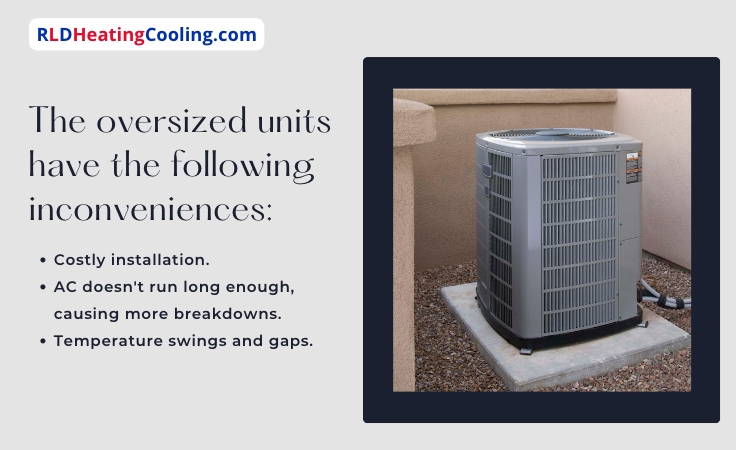
- Costly installation.
- AC doesn’t run long enough, causing more breakdowns.
- Improper dehumidification – Your house will feel cold but clammy.
- Temperature swings and gaps.
The basics of the central air conditioner
A central air conditioner works similar to a refrigerator in your home.
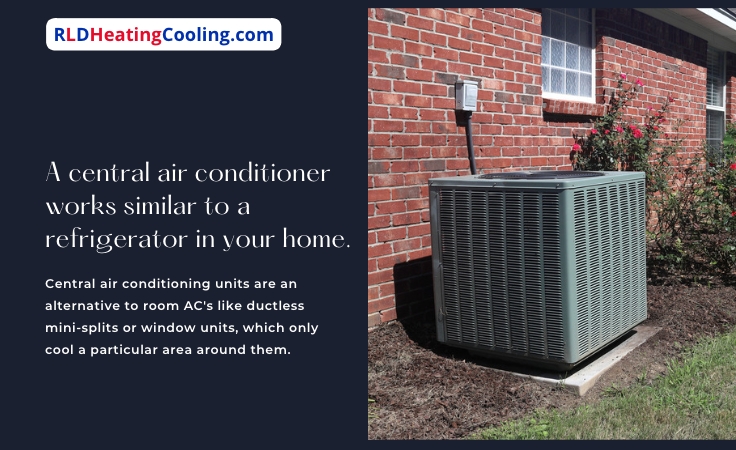
When warm air is blown across the evaporator coil in the air conditioning unit, the heated air is blown to the refrigerant in the coil, and cool air is produced.
The cooled air is then pushed through the blower throughout your house.
On the other hand, the heat accumulated by the condenser remains outside the house.
Central air conditioning units are an alternative to room ACs like ductless mini-splits or window units, which only cool a particular area around them.
As we know a central AC’s functionality, let’s discuss the critical factors.
Factors to keep in mind before choosing a central ac
There are a variety of central air conditioning brands, each offering a range of variations.
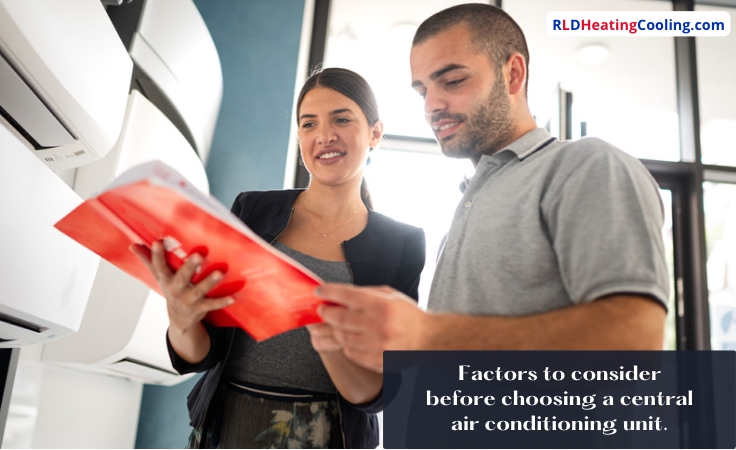
And that’s why choosing the perfect unit can be complicated at times.
Additionally, you will spend a considerable amount of money on your equipment, which will likely be with you for around 15-20 years.
So, you won’t want your money to flush down the drain.
Therefore, you must make a wise choice that serves your purpose and is also a value for money.
Here are some factors to consider before selecting a central air conditioning unit.
How to choose a central air conditioner: Factor #1: Unit type
There are two types of central air conditioners:
Split system
The AC compressor and condenser are placed outside your house in this type of AC unit.
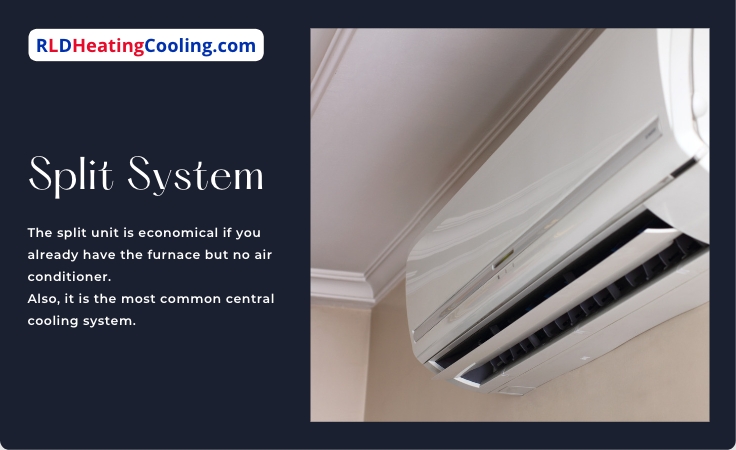
On the contrary, the evaporator coil is placed on the inside.
It uses the same air handling unit (the fan and the air intake) as the furnace.
The split unit is economical if you already have a furnace but no air conditioner.
Also, it is the most common central cooling system.
Packaged system
In this system, the central air conditioner, condenser, evaporator and compressor are all fitted in one metal box or cabinet.
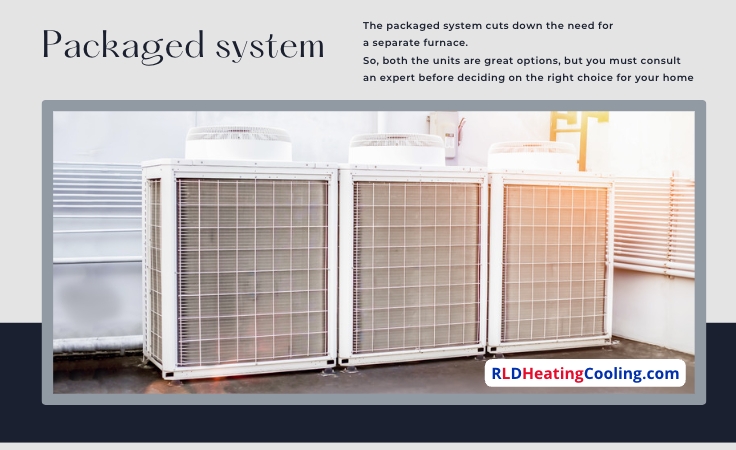
The box is placed on a concrete slab or a roof next to your house.
It can also be packed with a heat pump or a furnace, making it an ideal combination for homes with limited or low indoor space.
The hot air is transferred from the inside to the outside, releasing the heat to the exterior units.
The air is then processed, and the cooled air is transferred back indoors.
The packaged system cuts down the need for a separate furnace.
So, both the units are great options, but you must consult an expert before deciding on the right choice for your home.
How to choose a central air conditioner factor #2: Fan speed
What are the variations and levels of fan speeds available from an ideal air conditioning system?
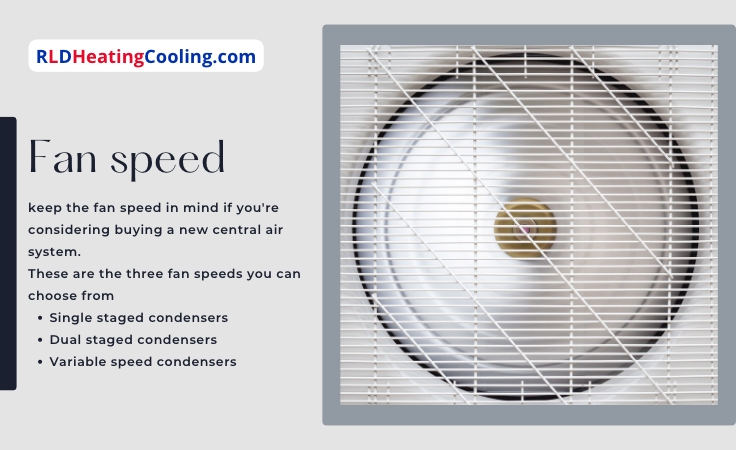
Keep the fan speed in mind when considering a new central air system.
These are the three fan speeds you can choose from:
Single-stage condensers
Single-stage condensers are at the primary level in the cooling systems.
The condensers are either running at total capacity or are off.
Single-stage condensers are a great entry-level option, but this might not be the right fit if you want a high-efficiency performance.
Additionally, it switches on and off frequently, resulting in higher energy bills.
Dual-stage condensers
The dual-stage condensers are a great fit if you’re looking for an air conditioner for your home that functions in two modes.
The best feature about dual-stage condensers is that it runs n both low and high speeds depending on the weather.
So, you can experience both a full blast mode and one that ranges between 60% and 70%.
These settings help your air conditioner operate more efficiently than a single-stage unit and cost less than a variable-speed unit.
Additionally, the dual-stage units do not switch on and off frequently, allowing you to save a significant amount of energy.
If you’re considering upgrading your system to a dual-stage condenser, check the indoor furnace or air handler, thermostat, or evaporator coil to ensure they’re compatible.
Variable speed condensers
Variable-speed condensers run throughout the day with longer cycles, rather than turning on and off to match the desired temperature.
These units give you better energy efficiency than the other two, but are the most expensive of the three options.
To install this type of condenser, you must have a suitable system.
A suitable system is one in which the condenser, furnace/air handler, evaporator coil and thermostat are manufactured by the same manufacturer and designed to work together.
These systems run all day, thanks to their 700+ fan speeds.
Additionally, they provide the ultimate energy efficiency because they don’t attempt to achieve the desired temperature.
Note: You need the right system for your variable units to work correctly. A matching system is one in which all the air conditioner parts come from the same manufacturer and are designed to work together.
A variable system, although more expensive to purchase than the other two, will save you a significant amount on energy costs. The same is true for the comparison between dual-stage and single-stage. The dual-stage is an upgrade from the single-stage.
How to choose a central air conditioner factor #3: AC Size you need
The bigger isn’t always the better.
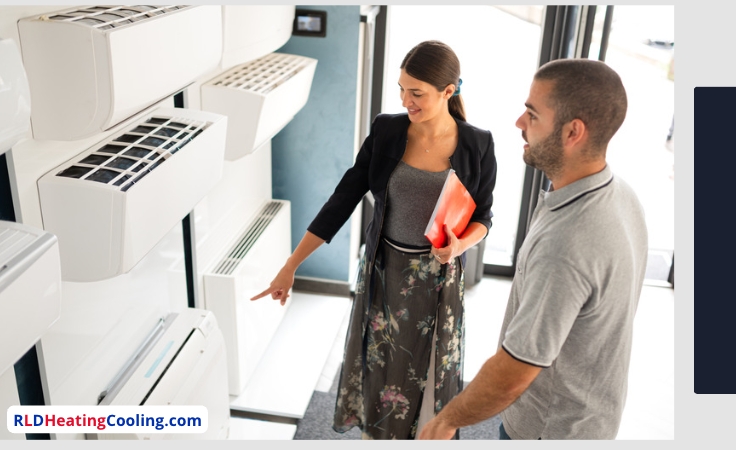
In fact, in the case of an appropriately sized air conditioner, if a unit is too large for the space, the equipment becomes inefficient, making the environment uncomfortable.
Air conditioners are designed to remove humidity, but an oversized air conditioner can create a damper effect.
So, the best AC for you is the one that fits your home.
But how do we know what fits the best for our homes?
Well! There are a dozen factors to consider that can have a significant impact on your energy costs and comfort.
Here are some of them:
- The size of your house.
- Age of your house.
- Duct size and airflow tolerance.
- Materials used during construction.
- Size and number of windows.
- The amount of sunlight your house gets and where it strikes.
- Insulation amount, age and type.
Even two homes with the same floor plans and construction materials will have different cooling needs. For instance, nearby trees can provide shade to one house and not another, which means one house is naturally better than the other.
These factors can significantly impact the effectiveness of your AC system and determine the optimal unit size to choose.
Air conditioners are measured in tons or British Thermal Units (BTUs), and the ton has nothing to do with weight. Therefore, one ton is equivalent to 12,000 BTUs.
A single-ton or 12000 BTU air conditioning unit provides comfortable cooling for a house of 600-800 square feet, and so on.
If you want to get the best cooling solutions for your home—with every factor accounted for—we suggest scheduling a consultation with RLD’s HVAC experts.
A properly trained AC technician will help you determine the right size for your home.
They can perform a load calculation to determine the size of your AC unit that fits your home.
How to choose a central air conditioner: Factor #4: Energy efficiency
Energy-efficient appliances tend to be more expensive upfront, but an efficient cooling system can reduce your monthly energy bills and carbon footprint.
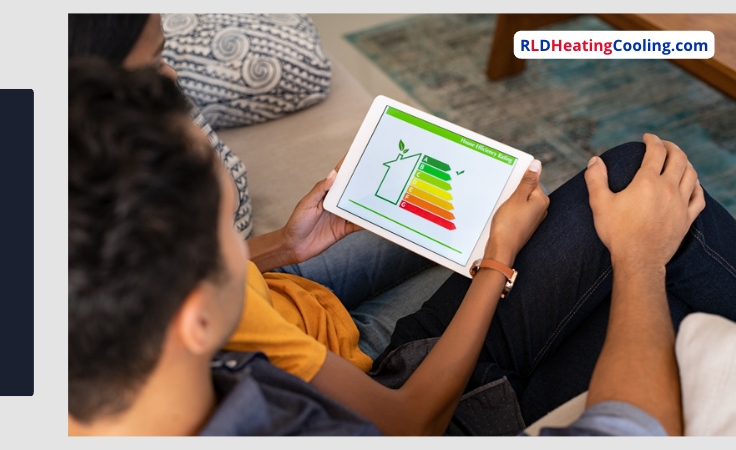
Regarding budgeting, it’s essential to understand how energy efficiency is measured to find the right balance based on your needs.
The more efficient the cooling unit, the less energy it requires to perform its job, which in turn reduces operating costs.
But when deciding to choose a central air conditioner for your home, how do you know which air conditioner works best?
The efficacy of heating, ventilation and air conditioning systems (HVAC units) is measured in SEER, which stands for Seasonal Energy Efficiency Rating.
How to choose a central air conditioner factor #5: SEER rating
The SEER, or Seasonal Energy Efficiency Ratio, measures the efficiency of your HVAC equipment using different seasonal temperatures.
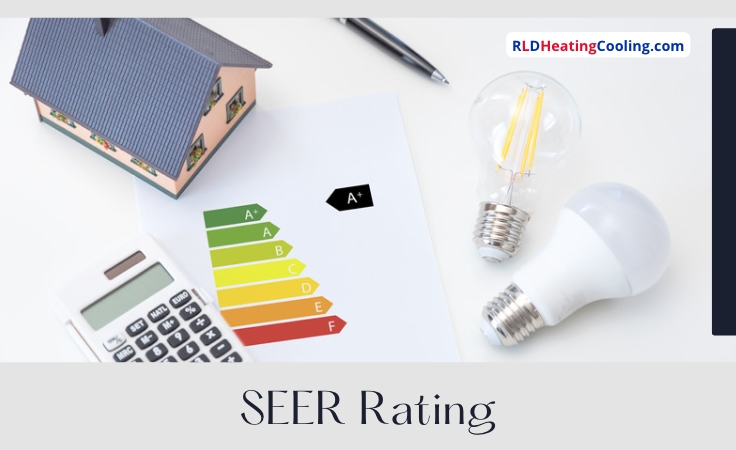
Some air conditioners have an EER (Energy Efficiency Ratio). An EER is similar to a SEER, but it uses the outdoor temperature to measure the efficiency of your system.
The higher the SEER rating of the equipment, the better your house’s energy efficiency and comfort.
The most common units installed in the United States range from 13 to 16 SEER, but ultimately, your unit’s energy rating depends on your personal preference.
Some years ago, it was relatively uncommon to find air conditioners with SEER ratings of 6-10; however, the AC units in the US now have a minimum of 14 SEER ratings, with some as high as 22.
However, air conditioning units with higher SEER ratings can be a little pricier than those with lower SEER ratings.
However, considering the lifespan of a central AC, which is approximately 15 years, you can recoup the initial cost through annual energy savings.
There is much more to consider.
The value of SEER and more expensive models also depends on how much you will use the HVAC system.
For example, some people will set their home’s thermostat to 75 degrees during the peak summer months, while others will put it to 70.
Homes requiring a low thermostat setting will therefore demand a better AC unit.
Therefore, the higher the SEER rating, the greater the energy savings.
How to choose a central air conditioner: Factor #6: Environmental impact
Generally, the two things we look for in an air conditioner are efficiency and value for money.
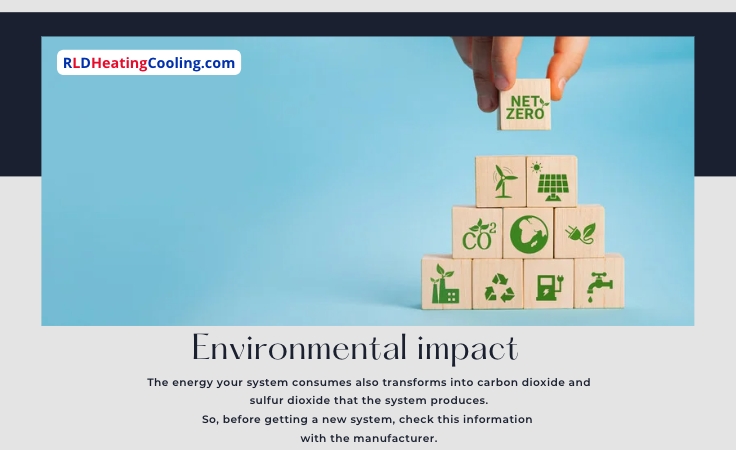
However, does your air conditioner have an impact on the environment? It is upon you to decide.
First of all, the higher SEER rating AC doesn’t just save you from the high energy bills, but it’s also a step towards protecting the environment.
The energy your system consumes also transforms into carbon dioxide and sulfur dioxide that the system produces.
Before purchasing a new system, verify this information with the manufacturer.
We recommend making a green decision when purchasing a new air conditioning unit.
How to choose a central air conditioner factor #7: Noise level
All systems make noise while operating, and that’s normal.
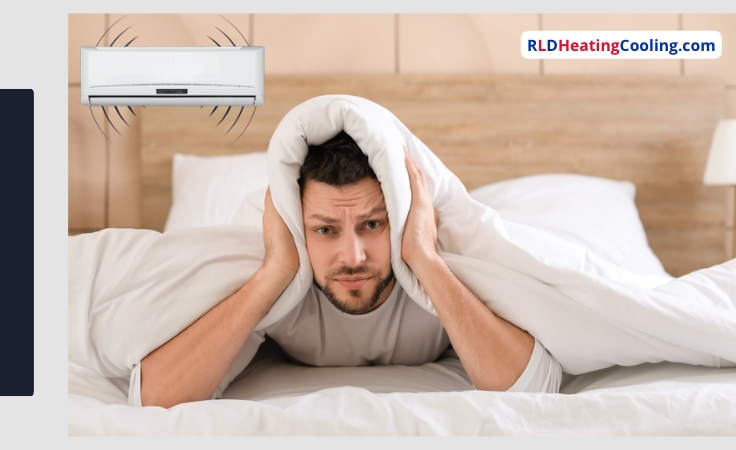
But some brand systems are quieter than others.
The noise might be just a whirring sound, which makes the nighttime comfortable.
However, we know you’d want a unit with lower sound levels than others.
The aim, therefore, is to find a system with quieter noise that fades into the background, much like white noise.
Therefore, we recommend that you consider the product’s speed and noise levels before making a purchase.
Brands generally reveal the noise level in decibels. Therefore, consider those units that make the lowest decibels.
Note:
Tip: A variable-speed air conditioning unit is often quieter because it does not have to run on high all the time. Additionally, some fan blades feature a noise-reducing design. Take advantage of these if you are looking for the quietest option possible.
How to choose a central air conditioner factor #8: Cost
It is crucial to keep in mind when buying anything, not just an air conditioner.
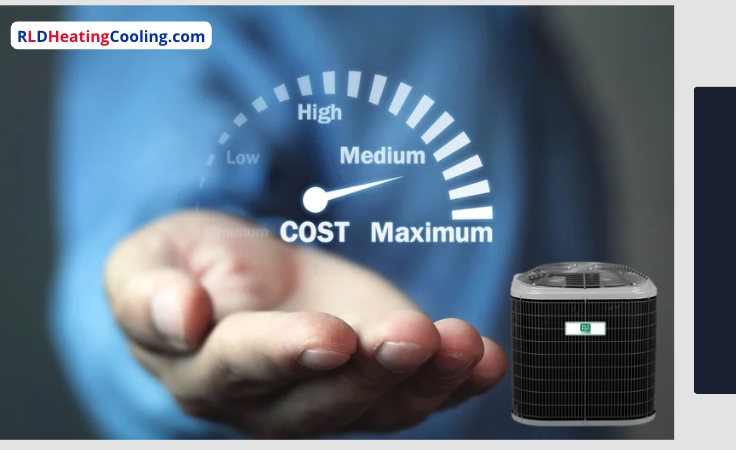
When choosing the best-fitting air conditioner for your home, aim to provide a comfortable temperature, even if it is expensive.
However, we advise you to read all the ratings and reviews of the AC units to check if they align with the Cost.
Additionally, consider other factors such as durability and energy efficiency.
Remember that the cheapest option isn’t always the perfect option, and in rare cases, it can be inefficient.
You must also consider the savings in energy and repair costs by investing in the correct size and high-quality AC units.
The cost of central air conditioners varies according to the size of your home and the existing duct system.
The older houses with electric floorboard heat or radiators would need extensive work.
On the contrary, houses with forced-air furnaces must undergo casual upgrades.
For central air conditioners, the price range starts at $ 3,000 for 2-ton units and increases to $ 5,000 for mid-range units, with costs rising to almost $10,000 for larger units(1).
The Cost of installation of a central air conditioner is also high. The costs can run up to $6000 sometimes.
How to choose a central air conditioner factor #9: Installation
When we discuss central AC installation, the process and speed are comparable to those of standard AC units.
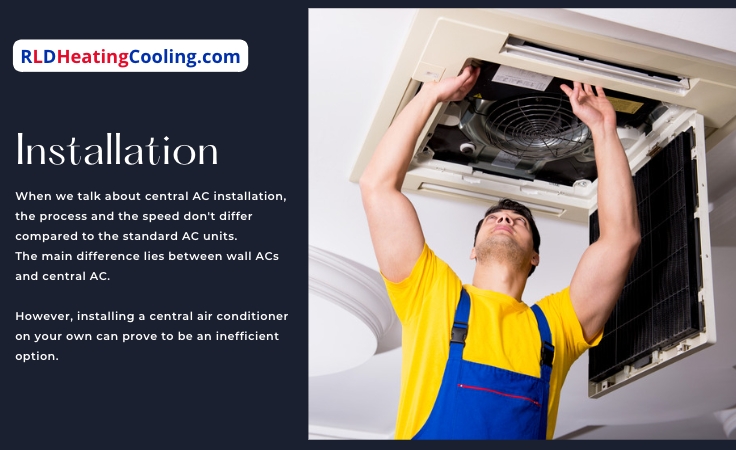
The main difference lies between wall ACs and central ACs.
The window and freestanding units don’t require professional installation; however, if a problem arises, you can seek the help of an expert.
For central air conditioners, it is recommended to take the help of a professional.
The reason is That There is a requirement for several permits, specialized knowledge, and the need for specific equipment to handle the process.
Additionally, the professional technician must be certified to perform both the AC and heating installation process.
If you’re considering installing the unit, you may save a significant amount of money, but you’d have to undergo a lengthy permit and certification process to do so.
However, installing a central air conditioner on your own can prove to be an inefficient option.
How to choose a central air conditioner: Factor #10: Choosing a provider
Now that you’re already aware of various central air conditioner types, sizes, energy ratios, and efficiency, it is time to choose a provider.

Your AC installer must possess in-depth knowledge, experience and expertise in HVAC systems.
Apart from that, they should be able to provide you with a proper understanding and learning regarding all the steps outlined in this article.
Also, before agreeing to a contract, we recommend you learn about:
- The company’s policy,
- Services,
- Costs,
- Payment options,
- Warranties etc.
Here is a list of licenses your provider must hold:
- Gas license.
- ESA permits.
- 313a refrigeration or 313d residential air conditioning license.
- Ozone Depletion Prevention (ODP) license.
How to choose a central air conditioner factor #11: Durability
Durability or life span is a crucial factor to consider when purchasing a central air conditioner.
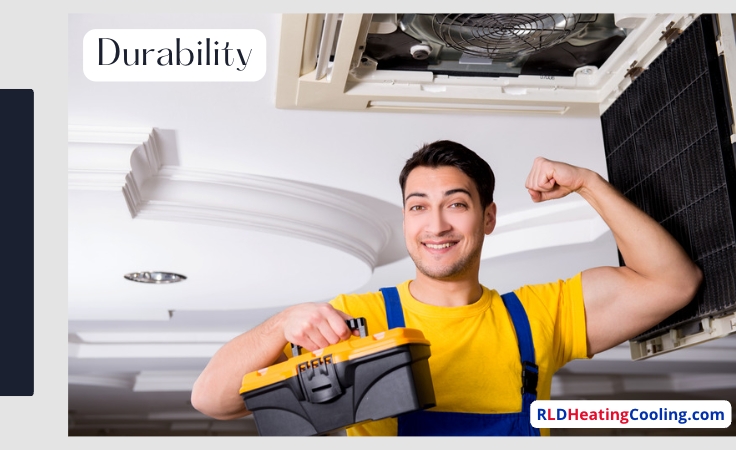
Buying a central air conditioner is a huge investment, and it is crucial to look for a durable unit.
The durability of the air conditioner is generally affected when it is too large for the room.
A unit that is too large will cool the room or house too quickly and then switch off. However, because it didn’t run according to the normal cycle, the heat returns to the room again.
It would force you to turn the unit on more frequently than usual.
The process is called short cycling, and it reduces the life of your air conditioner because the unit is constantly switching on and off.
How to choose a central air conditioner factor #12: Warranty
The air conditioner’s warranty ensures that the system will last for many years.
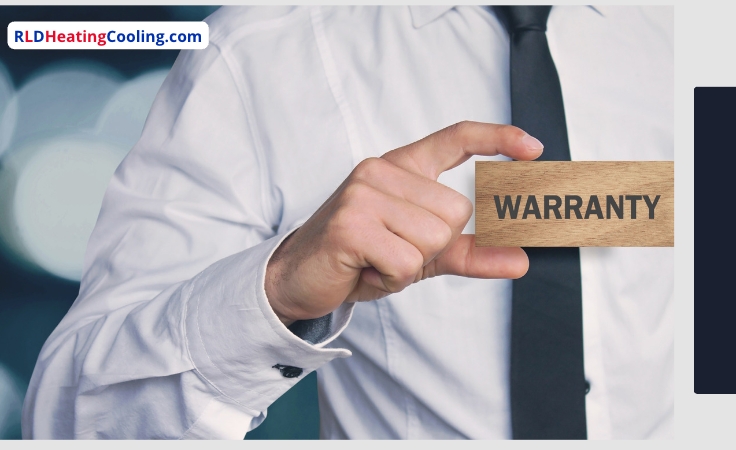
Apart from the warranty for the HVAC system, you should also inquire about the warranty for the installation.
Before buying a central AC, learn about its warranty and be well-versed with the terms and conditions.
AC warranties differ from one manufacturer to another.
A warranty may cover most units under a single set of terms or offer different coverage for different unit components.
Regarding life expectancy, a new central air conditioner is expected to last over 20 years.
So, it’s better to select a manufacturer that warranties their equipment and also an installer who will be available to help you with any mechanical or electronic problems.
How to choose a central air conditioner factor #13: Maintenance and repair
Most central air conditioners are low maintenance and don’t require frequent upkeep.
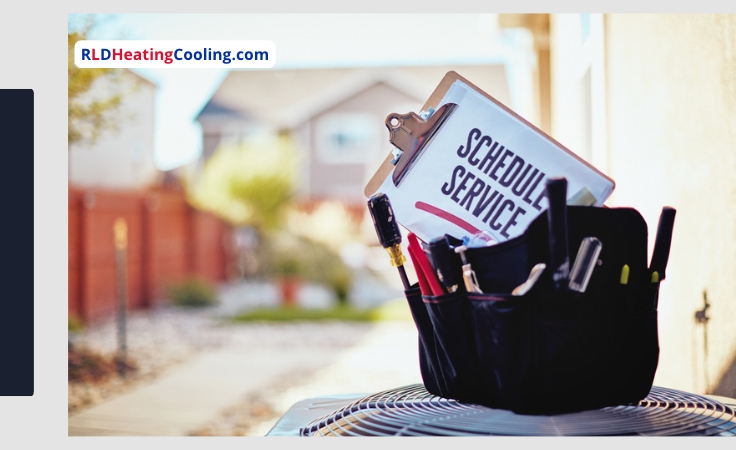
In the Central ACs, the air filters are the most specific and crucial to maintain.
A filter typically lasts for one to six months, depending on the filter type and whether you have pets or are allergy-sensitive.
Other maintenance services include cleaning the interior duct system or the exterior unit as per the requirement. Expect to pay $150 to $200 per year for repair and maintenance, unless you choose to do it yourself.
How to choose a central air conditioner: Factor #14: Financial incentives
You can also opt for financial incentives, such as new air conditioners and heating systems, which save energy.
The government tax credits are often available to all who decide to replace their air conditioners due to the energy savings.
These tax credits are available online, and air conditioning experts and professionals are also aware of them.
Conclusion
We have mentioned all the factors and tips for choosing a central AC unit.
At this stage, we are confident that you will be able to select the best central air conditioner for your needs.
Now you know what features you need and what you can compromise on.
If you still have any lingering doubts, please consult our technicians at RLD Heating and Cooling Services.
We’ll try to clear up all your doubts, and you’ll receive a great response from us.
FAQs
Here are some of the questions people usually ask regarding how to choose a central air conditioner:
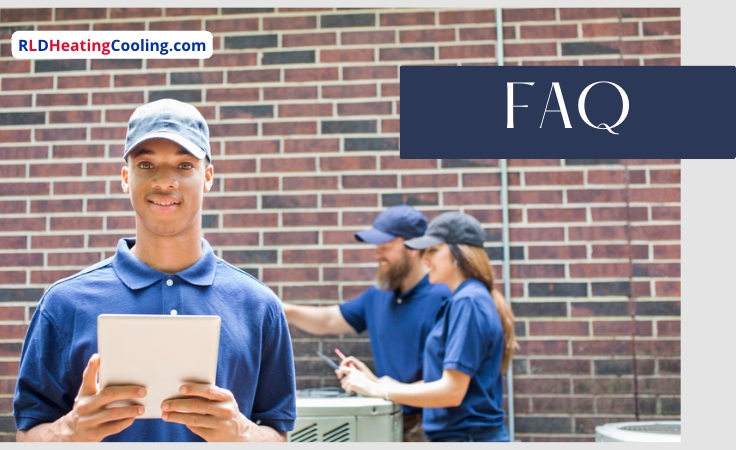
How do I choose a good central air conditioner?
The best way to choose a good central air conditioner is by following the steps mentioned below:
- Find the right size – Decide on what type and size of HVAC system is suitable for your home. If you’re having difficulty calculating the right size, consider asking a professional technician to perform a load calculation.
- Check the SEER rating- Consider the energy savings and how it will offset the Cost of a high-efficiency unit.
- Eye on the Warranty- Although new central air conditioners usually have long lifespans, for your peace of mind, opt for a good warranty.
- Know your installer and technician- Ensure that your installation technician is certified by the manufacturer of your new central air conditioning system.
With these tips by your side, you make your home and your space a little more comfortable.
How do I determine the correct size of the central air conditioner I need?
To determine the right size of your central air conditioner, you need to use a simple math equation.
You can easily calculate the AC unit size that will fit your home perfectly.
It is what the equation looks like:
[(Home square footage multiplied 25 times, divided by 12000) – 0.5] = the suitable tons.
How many square feet will a 3-ton central AC unit cool?
The answer to this is pretty simple.
3-ton AC is equal to 36.000 BTU (British Thermal Unit).
According to the standard of one ton per 600 square feet, a 3-ton air conditioner can effectively cool approximately 1800 square feet.
What size AC do I need for 2000 square feet?
If your home is 2000 square feet, you can easily calculate the size of your air conditioner the way you’d calculate for your 1600 square feet home.
Assuming that a single ton of cooling capacity can cool 400 square feet of your house, you will need a 5-ton air conditioning unit to cool your 2000 square feet house.
Multiply it by 12000 BTUs, and you’ll get 60,000 BTUs.
What happens if I buy an oversized AC unit?
The following are the disadvantages of installing a large AC:
- High installation charges,
- AC is not running long enough,
- The unit might frequently zone on and off,
- Huge temperature swings.
- Insufficient dehumidification.
What happens if I buy an undersized AC unit?
The following are the downsides of an undersized AC:
- Quick wear and tear of the unit.
- High energy bills.
- The short lifespan of the equipment.
- A unit might not provide sufficient cooling.
What are the five most important factors for an AC unit?
The five crucial factors to consider while choosing a new air conditioner unit for your home are:
- Size & capacity.
- Energy savings and usage.
- Special features.
- Ease of installation.
- Price.
Resources
https://www.carrier.com/residential/en/us/products/air-conditioners/prices/#:~:text=Air%20conditioner%20costs%20typically%20range,will%20all%20incur%20additional%20expenses.
